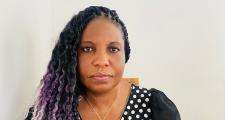Rise of the far right – a social worker’s warning

Anti-immigration rhetoric fuels division, fear, and racism.
As the UK experiences a political swing to the right, Black social workers are increasingly facing a climate of fear, hostility, and racial abuse on the frontlines of humanitarian work, safeguarding vulnerable children, supporting struggling families, and ensuring the welfare of our most at-risk communities.
Also, for social work educators, social justice and diversity, equity and inclusion advocates, the atmosphere has become not only demoralising but scary.
The rise of the far-right, whose central narrative blames immigration for the UK’s multifaceted challenges, is not just deeply concerning; it’s life-threatening for many.
Social workers, health professionals, and care workers, many of whom are from minoritised ethnic backgrounds, are feeling the brunt of a dangerous and divisive discourse that distorts facts and redirects public frustration onto those who work tirelessly to keep the country going.
In the face of 111,000 vacant posts in adult social care and increasing reliance on non-EU nationals, it is critical the staff doing this work feel safe and enabled to give their best.
Let’s be clear: Britain is grappling with wealth inequality, a cost of living crisis, a housing shortage, stretched public services, and a mental health epidemic, particularly for children, young people and young adults.
Yet rather than focus on sustainable solutions, many politicians across the spectrum seem to increasingly frame immigration as the root of all national problems.
This distracts from the urgent reforms needed in housing, health, and education and plays directly into the hands of extremists.
The different political parties can be seen to be focusing mainly on immigration and echoing the same rhetoric. Amid this, it is deeply troubling that the leader of the opposition, a Black Woman of Nigerian heritage who might be expected to bring lived experience and understanding to these issues, is also seen pushing a hardline stance on immigration.
For many Black and brown social workers this adds to the emotional toll and confusion in an already racially charged environment. In their minds, a pressing question echoes: “Who’s got our backs?”
One cannot overstate the rising anxiety and trauma this climate is creating. Social workers and health workers are the backbone of social care across the country, working long shifts in a very delicate but sometimes hostile environment under stressful conditions.
As Black social workers, feeling a gnawing sense of being vilified is another huge challenge to contend with, and many are questioning: where do we belong in a nation that is becoming increasingly unwelcoming?
Immigration has long been an integral part of Britain’s success story. We proudly mint and circulate coins bearing the words “Diversity Built Britain.” This is not just symbolic; it’s factual.
Immigrants and their descendants are vital contributors to the NHS, the care sector, education, public safety, and countless other areas that keep society functioning.
The truth is uncomfortable, but it must be said. The lies, scapegoating, and political point-scoring around immigration have real-world consequences. They lead to division, violence and fear and threaten peace and unity in our communities.
Now more than ever, political leaders must reject divisive narratives and reaffirm their commitment to fairness, inclusion, and justice. They must show a commitment to harnessing Britain’s diversity as a strength for national growth and progress. The language we use matters. It shapes policy, public opinion, and social cohesion.
According to the social work curriculum the role of social work is firmly rooted in the fight for social justice and social change. This includes protecting the most vulnerable, standing with the marginalised, and promoting dignity for all.
Silence is not an option; it is complicity. The cost of inaction is far too high. Social workers must stand tall and continue as co-advocates for justice, equity, and meaningful change.
Great Britain is home to diversity, which contributes to making it a great nation. We urge our politicians and leaders to lead with compassion and inclusion. And we urge our fellow citizens to rise above the tides of hate.
Because the truth is that our diversity is not a threat; it is our strength.
Vivian Okeze-Tirado is head and founder of VOT Training and Consultancy Services which promotes diversity, inclusion and anti-racism within social care. She is a former winner of Social Worker of the Year, and is also the author of D.I.V.E.R.S.I.T.Y: A guide to working with diversity and developing cultural sensitivity
